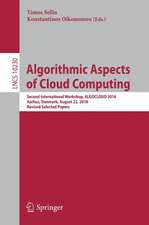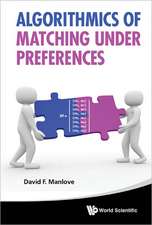Software Prototyping in Data and Knowledge Engineering: Mathematics and Its Applications, cartea 497
Autor G. Guida, G. Lamperti, Marina Zanellaen Limba Engleză Paperback – 11 oct 2012
The book is organised in two parts. The first part, comprising chapters 1 to 4, provides an introduction to the concept of prototyping, to database and knowledge-based technologies, and to the main issues involved in the integration of data and knowledge engineering. The second part, comprising chapters 5 to 12, illustrates the proposed approach in technical detail.
Audience: This volume will be of interest to researchers in the field of databases and knowledge engineering in general, and for software designers and knowledge engineers who aim to expand their expertise in data and knowledge intensive systems.
| Toate formatele și edițiile | Preț | Express |
|---|---|---|
| Paperback (1) | 652.22 lei 6-8 săpt. | |
| SPRINGER NETHERLANDS – 11 oct 2012 | 652.22 lei 6-8 săpt. | |
| Hardback (1) | 658.52 lei 6-8 săpt. | |
| SPRINGER NETHERLANDS – 30 noi 1999 | 658.52 lei 6-8 săpt. |
Din seria Mathematics and Its Applications
- 18%
 Preț: 945.62 lei
Preț: 945.62 lei - 15%
 Preț: 648.42 lei
Preț: 648.42 lei - 15%
 Preț: 651.99 lei
Preț: 651.99 lei - 15%
 Preț: 591.61 lei
Preț: 591.61 lei -
 Preț: 394.29 lei
Preț: 394.29 lei - 18%
 Preț: 955.56 lei
Preț: 955.56 lei - 15%
 Preț: 586.85 lei
Preț: 586.85 lei - 5%
 Preț: 655.17 lei
Preț: 655.17 lei - 15%
 Preț: 658.70 lei
Preț: 658.70 lei - 15%
 Preț: 648.56 lei
Preț: 648.56 lei - 15%
 Preț: 604.84 lei
Preț: 604.84 lei -
 Preț: 394.87 lei
Preț: 394.87 lei - 15%
 Preț: 651.84 lei
Preț: 651.84 lei -
 Preț: 374.76 lei
Preț: 374.76 lei -
 Preț: 394.51 lei
Preț: 394.51 lei - 15%
 Preț: 706.30 lei
Preț: 706.30 lei -
 Preț: 391.02 lei
Preț: 391.02 lei -
 Preț: 389.70 lei
Preț: 389.70 lei - 15%
 Preț: 585.04 lei
Preț: 585.04 lei - 15%
 Preț: 653.98 lei
Preț: 653.98 lei - 15%
 Preț: 587.02 lei
Preț: 587.02 lei - 20%
 Preț: 577.42 lei
Preț: 577.42 lei -
 Preț: 395.47 lei
Preț: 395.47 lei - 15%
 Preț: 601.88 lei
Preț: 601.88 lei - 15%
 Preț: 594.53 lei
Preț: 594.53 lei - 15%
 Preț: 651.84 lei
Preț: 651.84 lei - 15%
 Preț: 649.06 lei
Preț: 649.06 lei -
 Preț: 392.21 lei
Preț: 392.21 lei - 15%
 Preț: 649.06 lei
Preț: 649.06 lei - 15%
 Preț: 643.48 lei
Preț: 643.48 lei -
 Preț: 398.15 lei
Preț: 398.15 lei
Preț: 652.22 lei
Preț vechi: 815.27 lei
-20% Nou
Puncte Express: 978
Preț estimativ în valută:
124.81€ • 129.57$ • 104.08£
124.81€ • 129.57$ • 104.08£
Carte tipărită la comandă
Livrare economică 24 martie-07 aprilie
Preluare comenzi: 021 569.72.76
Specificații
ISBN-13: 9789401058490
ISBN-10: 9401058490
Pagini: 432
Ilustrații: XVII, 408 p.
Dimensiuni: 160 x 240 x 23 mm
Greutate: 0.6 kg
Ediția:1999
Editura: SPRINGER NETHERLANDS
Colecția Springer
Seria Mathematics and Its Applications
Locul publicării:Dordrecht, Netherlands
ISBN-10: 9401058490
Pagini: 432
Ilustrații: XVII, 408 p.
Dimensiuni: 160 x 240 x 23 mm
Greutate: 0.6 kg
Ediția:1999
Editura: SPRINGER NETHERLANDS
Colecția Springer
Seria Mathematics and Its Applications
Locul publicării:Dordrecht, Netherlands
Public țintă
ResearchCuprins
1 The Prototyping Approach to Software Development.- 1.1 Linear Software Development.- 1.2 Software Prototyping.- 1.3 Iterative Software Development.- 1.4 The Evolutionary Perspective of Software Development.- 1.5 User-Centered Software Design and Development.- 1.6 Software Prototyping Approaches.- 1.7 Classification of Software Prototypes.- 1.8 Software Prototyping and Prototypes..- 1.9 Goals of Software Prototyping..- 1.10 Prototyping and Software Evaluation..- 1.11 Involvement and Role of Users in Software Prototyping.- 1.12 Misconceptions about Software Prototyping.- 1.13 Rules of Software Prototyping.- 1.14 Requirements for Software Prototyping Environments.- 1.15 Object-Oriented Programming and Prototyping.- 1.16 Object-Oriented CASE Tools for Prototyping.- 2 Overview of Database Technology.- 2.1 Extended Relational Databases.- 2.2 Deductive Databases.- 2.3 Object Databases.- 2.4 Active Databases.- 2.5 Temporal Databases.- 2.6 Spatial Databases.- 2.7 Multimedia Databases..- 2.8 Data Warehousing..- 2.9 Data Mining.- 3 Overview of Knowledge-Based Technology.- 3.1 Knowledge-Based Systems..- 3.2 The Challenge of Knowledge-Based Systems..- 3.3 Knowledge-Based Technology: Techniques, Tools and Methodologies.- 3.4 KBS Techniques.- 3.5 KBS Tools.- 3.6 KBS Methodologies.- 3.7 Beyond Knowledge-Based Technology: A knowledge Management Perspective.- 4 Data and Knowledge Intensive Systems.- 4.1 Computer Problem-Solving.- 5 The Prototyping Hierarchy.- 5.1 Approach and Architecture.- 5.1.1 Star Architecture.- 5.2 Reference Application..- 6 The Relational Layer.- 6.1 Relational Paradigm.- 6.2 Relational Prototyping Language.- 6.3 Prototyping by Relational Techniques.- 6.4 Prototyping the Relational Layer.- 7 The Extended Relational Layer.- 7.1 Extended Relational Paradigm.- 7.2 Extended Relational Prototyping Language..- 7.3 Prototyping by Extended Relational Techniques.- 7.4 Prototyping the Extended Relational Layer.- 8 The Deductive Layer.- 8.1 Deductive Paradigm.- 8.2 Deductive Prototyping Language.- 8.3 Prototyping by Deductive Techniques.- 8.4 Prototyping the Deductive Layer.- 9 The Object Layer.- 9.1 Object Paradigm.- 9.2 Object Prototyping Language..- 9.3 Prototyping by Object Techniques.- 9.4 Prototyping the Object Layer..- 10 The Active Layer.- 10.1 Active Paradigm.- 10.2 Active Prototyping Language.- 10.3 Prototyping by Active Techniques.- 10.4 Prototyping the Active Layer.- 11 Prototyping Techniques Integration.- 11.1 Integrated Paradigm.- 11.2 Integrated Prototyping Language.- 12 Mapping Prototypes to Relational Databases.- 12.1 Transforming Passive Rules into Active Rules.- 12.2 Mapping Schemas..- 12.3 Mapping Declarative Expressions.- 12.4 Mapping Procedural Code.- 12.5 Mapping Nonrecursive Passive Rules.- 12.6 Mapping Active Rules.- References.

















